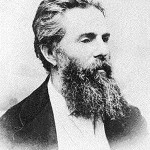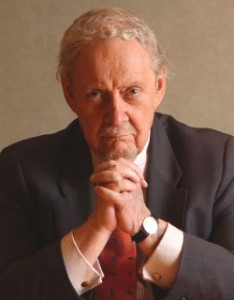“Ah, Bartleby! Ah, humanity.”
 Herman Melville’s novella “Billy Budd” has firmly secured its place in the law and literature canon, but a different law-related work by Melville is my favorite. Over the last twenty-five years or so I have almost annually read “Bartleby the Scrivener – A Story of Wall Street” (1853), being moved by it more each time.
Herman Melville’s novella “Billy Budd” has firmly secured its place in the law and literature canon, but a different law-related work by Melville is my favorite. Over the last twenty-five years or so I have almost annually read “Bartleby the Scrivener – A Story of Wall Street” (1853), being moved by it more each time.
The narrator of the story is a humane, tolerant lawyer who was formerly a Master in Chancery and who now presides over a small Wall Street law office. His employees include an office boy and three scriveners, the most eccentric of whom is Bartleby. Demonstrating a certain “pallid haughtiness,” the latter at first refuses to complete small assignments and then over time declines to do anything at all. His signature statement when asked to copy a legal document, to run an errand, or – ultimately – to seek work elsewhere is “I would prefer not to.” In one of the lighter interludes of the story, all of the characters, the narrator included, cannot stop using the word “prefer” in their own comments.
However, the story is neither farcical comedy nor romantic fantasy. With the lawyer/narrator as our introspective vehicle, we as readers are invited to make sense of Bartleby as a symbolic representation of humankind. Is Bartleby basically an alienated worker, doggedly copying documents to the detriment of his eyesight? Is he mentally ill, staring for hours out his small window at a black wall only three feet away? Does he display a hostile passive aggressiveness, refusing to be remunerated, fed, or simply helped?
The questions of course trump the answers. After the lawyer/narrator realizes Bartleby is sleeping in the Wall Street office, he grasps the true seriousness of the situation. The lawyer finds going to church useless, and he instead wanders the streets of antebellum Manhattan desperately trying to understand both Bartleby and the human condition. “My first emotions had been those of pure melancholy and sincerest pity,” the lawyer says, “but just in proportion as the forlornness of Bartleby grew and grew in my imagination, did that same melancholy merge into fear, that pity into repulsion.” The lawyer realizes that alms cannot solve the problem. It is Bartleby’s soul that suffers, and his soul cannot be reached.
In the end, the lawyer relocates his office on Broadway closer to City Hall, and the owner of the Wall Street building has the police remove Bartleby. He is taken to the Tombs, where he refuses to eat or communicate. The lawyer visits several times but to no avail. On his last visit he finds Bartleby curled up and dead with his face against a wall in the prison courtyard. “Ah, Bartlelby. Ah, humanity.”


